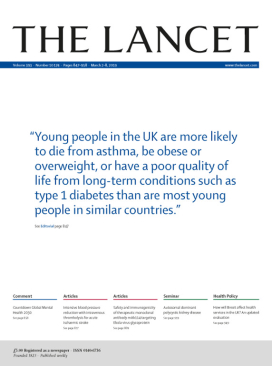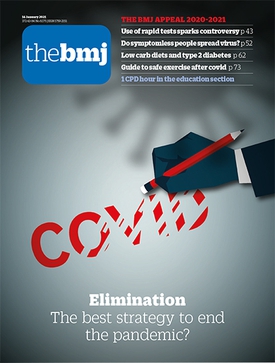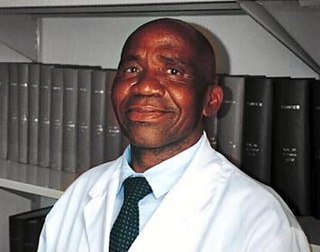See also
- BMJ Open , an open access journal
- Student BMJ , a student journal
The BMJ is a medical journal.
BMJ may also refer to:
BMJ)BMJ)bmj)
Arthroscopy is a minimally invasive surgical procedure on a joint in which an examination and sometimes treatment of damage is performed using an arthroscope, an endoscope that is inserted into the joint through a small incision. Arthroscopic procedures can be performed during ACL reconstruction.

The Lancet is a weekly peer-reviewed general medical journal and one of the oldest of its kind. It is also one of the world's highest-impact academic journals. It was founded in England in 1823.

The BMJ is a weekly peer-reviewed medical journal, published by BMJ Group, which in turn is wholly-owned by the British Medical Association (BMA). The BMJ has editorial freedom from the BMA. It is one of the world's oldest general medical journals. Previously called the British Medical Journal, the title was officially shortened to BMJ in 1988, and then changed to The BMJ in 2014. The journal is published by BMJ Publishing Group Ltd, a subsidiary of the British Medical Association (BMA). The current editor-in-chief of The BMJ is Kamran Abbasi, who was appointed in January 2022.
The British Medical Association (BMA) is a registered trade union and professional body for doctors in the United Kingdom. It does not regulate or certify doctors, a responsibility which lies with the General Medical Council. The BMA has a range of representative and scientific committees and is recognised by National Health Service (NHS) employers alongside the Hospital Consultants and Specialists Association as one of two national contract negotiators for doctors.

Hamilton Naki was a laboratory assistant to cardiac surgeon Christiaan Barnard in South Africa. He was recognised for his surgical skills and for his ability to teach medical students and physicians such skills despite not having received a formal medical education, and took a leading role in organ transplant research on animals.

Brian Deer is a British investigative journalist, best known for inquiries into the drug industry, medicine, and social issues for The Sunday Times. Deer's investigative nonfiction book The Doctor Who Fooled the World, an exposé on disgraced former doctor Andrew Wakefield and the 1998 Lancet MMR autism fraud, was published in September 2020 by Johns Hopkins University Press.
Within the National Health Service, resident doctors are qualified medical practitioners working whilst engaged in postgraduate training. The period of being a resident doctor starts when they qualify as a medical practitioner following graduation with a Bachelor of Medicine, Bachelor of Surgery degree and start the UK Foundation Programme. It culminates in a post as a consultant, a general practitioner (GP), or becoming a SAS Doctor, such as a specialty doctor or Specialist post.

Ben Michael Goldacre is a British physician, academic and science writer. He is the first Bennett Professor of Evidence-Based Medicine and director of the Bennett Institute for Applied Data Science at the University of Oxford. He is a founder of the AllTrials campaign and OpenTrials, aiming to require open science practices in clinical trials.
A journal club is a group of individuals who meet regularly to critically evaluate recent articles in the academic literature, such as the scientific literature, medical literature, or philosophy literature. Journal clubs are usually organized around a defined subject in basic or applied research. For example, the application of evidence-based medicine to some area of medical practice can be facilitated by a journal club.
Nutritional science is the science that studies the physiological process of nutrition, interpreting the nutrients and other substances in food in relation to maintenance, growth, reproduction, health and disease of an organism.
BMJ is a British publisher of medical journals, and healthcare knowledge provider of clinical decision tools, online educational resources, and events. Established in 1840, the company is owned by the British Medical Association. The company was branded as BMJ Group until 2013.
In medicine, a case report is a detailed report of the symptoms, signs, diagnosis, treatment, and follow-up of an individual patient. Case reports may contain a demographic profile of the patient, but usually describe an unusual or novel occurrence. Some case reports also contain a literature review of other reported cases. Case reports are professional narratives that provide feedback on clinical practice guidelines and offer a framework for early signals of effectiveness, adverse events, and cost. They can be shared for medical, scientific, or educational purposes.
David Lawrence Sackett was an American-Canadian physician and a pioneer in evidence-based medicine. He is known as one of the fathers of Evidence-Based Medicine. He founded the first department of clinical epidemiology in Canada at McMaster University, and the Oxford Centre for Evidence-Based Medicine. He is well known for his textbooks Clinical Epidemiology and Evidence-Based Medicine.

Jennifer Ann McCarthy-Wahlberg is an American actress, model, and television personality. She began her career in 1993 as a nude model for Playboy magazine and was later named their Playmate of the Year. McCarthy then had a television and film acting career, beginning as a co-host on the MTV game show Singled Out (1995–1997) and afterwards starring in the eponymous sitcom Jenny (1997–1998), as well as films including BASEketball (1998), Scream 3 (2000), Dirty Love (2005), John Tucker Must Die (2006), and Santa Baby (2006). In 2013, she hosted her own television talk show The Jenny McCarthy Show, and became a co-host of the ABC talk show The View, appearing on the program until 2014. Since 2019, McCarthy has been a judge on the Fox musical competition show The Masked Singer.
Claims of a link between the MMR vaccine and autism have been extensively investigated and found to be false. The link was first suggested in the early 1990s and came to public notice largely as a result of the 1998 Lancet MMR autism fraud, characterised as "perhaps the most damaging medical hoax of the last 100 years". The fraudulent research paper, authored by Andrew Wakefield and published in The Lancet, falsely claimed the vaccine was linked to colitis and autism spectrum disorders. The paper was retracted in 2010 but is still cited by anti-vaccine activists.
Open peer review is the various possible modifications of the traditional scholarly peer review process. The three most common modifications to which the term is applied are:

Andrew Jeremy Wakefield is a British fraudster, discredited academic, anti-vaccine activist, and former physician.
The German Law Journal is a peer-reviewed, online-only open access law journal reporting on the developments in German, European and international jurisprudence. It is published by Washington & Lee University School of Law.
Bullying in the medical profession is common, particularly of student or trainee physicians. It is thought that this is at least in part an outcome of conservative traditional hierarchical structures and teaching methods in the medical profession which may result in a bullying cycle.